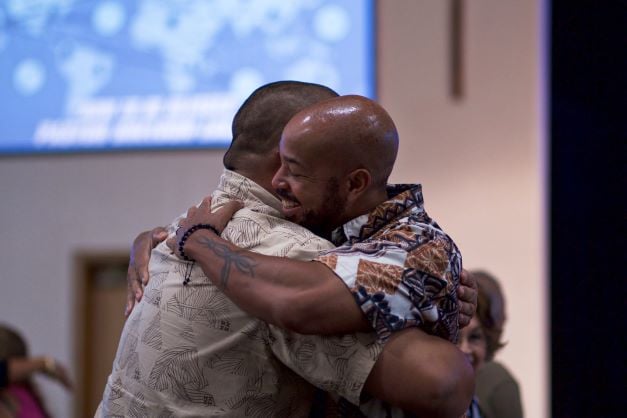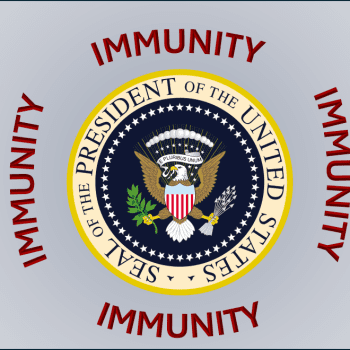“Mind your own damn business,” said Democratic VP candidate Tim Walz to Republicans. What he said was surprisingly biblical.
When Minnesota Governor Tim Walz was announced as Kamala Harris’s running mate in the 2024 presidential election, many of my Lutheran family, friends, and colleagues celebrated that he was Lutheran as well. Walz counts himself as a “Minnesota Lutheran dad,” and his church is part of the Evangelical Lutheran Church in America, the denomination in which I’m ordained.

The Lutherans in Minnesota are mostly descended from Scandinavian immigrants who settled the area in the 1800s, though Walz’s parents are Roman Catholic. Walz hasn’t talked at length (yet) about how his faith informs his stance on political issues. However, his support for affordable health care, education funding, social justice and equality, clean air and water, advocacy for the LGBTQIA+ community, and providing free lunch to all school children certainly reflect Jesus’s teachings to care for one’s neighbors, protect the vulnerable, and feed those in need.
But there was something Walz said in his rousing speech in Philadelphia on August 6 that revealed his understanding of the Bible in a folksy and memorable way.
In part of his speech, he said this:
Some of us are old enough to remember when it was Republicans who were talking about freedom. It turns out now what they meant was that the government should be free to invade your doctor’s office. In Minnesota we respect our neighbors and the personal choices that they make. Even if we wouldn’t make the same choice for ourselves, there’s a golden rule: Mind your own damn business!
In other words, Walz believes the government should not be dictating how one expresses their gender, who they love, what they read, what health care they can receive, or what religion they practice.
This contrasts with the christofascist architects of Project 2025 who want to implement their 900 pages worth of authoritarian thought-control and twisted, controlling morality on U.S. citizens through a second Trump administration.
While “Mind your own damn business” elicited raucous applause from the crowd, it also struck me that this phrase is surprisingly biblical. Both the Hebrew Scriptures and the New Testament contain teachings and instructions about not meddling in people’s personal affairs. These passages are applicable both to individuals and to lawmakers. Let’s dig in.
Old Testament Passages about Minding Your Own Damn Business
The Ten Commandments
This one may shock you. Aren’t the Ten Commandments all about dictating behavior? Well, yes and no. What they do is help us determine what’s acceptable and what’s not when it comes to how our personal actions impact others.
As the pastor of my home congregation, St. Paul’s Lutheran in York, Pa., taught me: Love God and do what you want.
If you love God, you won’t worship human-made idols or use God’s name for blasphemy – both of which center human power and use religion to justify this power. Also, if you love God, you’ll allow yourself and others a day of rest. You’ll honor your parents and others in society. If you love God, you won’t murder, harm your life partner, steal, lie, or scheme to take what others have.
In other words, mind your own damn business. If your business harms others, then we need to intervene. If not, the government should not be legislating the behaviors of others because it’s none of their damn business.

Two Pithy Passages from Proverbs about Minding Your Own Damn Business
Proverbs 25:17
Let your foot be seldom in your neighbor’s house,
otherwise the neighbor will become weary of you and hate you.
Proverbs is a collection of pithy aphorisms and advice that are as much about one’s faith as about how to live together in community. Proverbs 25:17 cautions against being overly intrusive in people’s lives and respecting others’ boundaries. This goes for individuals, but it also applies to the government which need not set foot in citizens’ personal lives unless there is something criminal or harmful going on.
Proverbs 26:17
Like one who grabs a stray dog by the ears is someone who rushes into a quarrel not their own.
Again, this works not just for individuals with a predilection of involving themselves in disputes that do not concern them, but for government interference in people’s lives. There is no need for busybodies or for the state to meddle in other people’s affairs.
So, stop grabbing the ears of the dog! Mind your own damn business!
4 New Testaments Passages about Minding Your Own Damn Business
1 Thessalonians 4:11-12
Paul wrote to the church in Thessalonica: “Aspire to live quietly, to mind your own affairs, and to work with your hands, as we directed you, so that you may behave properly towards outsiders and be dependent on no one.”
Did you catch that? Paul literally told folks: mind your own damn business! When self-righteous Christians try to dictate what you can and cannot do, whip out this verse to remind them to focus on their own lives and work. They don’t need to involve themselves in the affairs of others. Respect yourself and respect others. Seriously, it’s not that hard.
1 Peter 4:15
“But let none of you suffer as a murderer, a thief, a criminal, or even as a mischief-maker.”
Wow, Jesus’s right-hand man, Peter, put “mischief-makers” (i.e., meddlers) on par with murderers, thieves, and criminals!
Why so harsh? Because being a thought-policing sanctimonious busy-body stirs up trouble for people who are just minding their own business. For example, if a person want to dress in drag, or marry someone you don’t approve of, or read books to their kids that you don’t like, what business is that of yours? Stop targeting them. Because that can, in fact, lead to a mob mentality and, ultimately, murder and crime against innocent people.
Romans 14:10-13
Why do you pass judgment on your sibling? Or you, why do you despise them? For we will all stand before the judgment seat of God. For it is written,
‘As I live, says the Lord, every knee shall bow to me,
and every tongue shall give praise to God.’
So then, each of us will be accountable to God.
Let us therefore no longer pass judgment on one another, but resolve instead never to put a stumbling-block or hindrance in the way of another.
This is another passage that helps us distinguish what’s acceptable to pass judgment on and what’s not. Paul’s letter to the Romans tells us that if someone’s behavior is a “stumbling block” or “hindrance” that harms others, then we need to pay attention to that. If it’s not, then leave them alone.
As Tim Walz said in his speech, respect your neighbors and the personal choices that they make. Just because you wouldn’t make that choice for yourself does not mean you should pass judgment on them and hate on them and get everyone else in your circle to gang up on them.
For example, if a woman decides with her doctor to terminate her pregnancy, or if she decides to use IVF to become pregnant, that is her decision. Not yours, not the government’s. Mind your own damn business!
And finally a word about minding your own business from Jesus himself:
Matthew 7:3-5
“Why do you see the speck in your neighbor’s eye, but do not notice the log in your own eye? Or how can you say to your neighbor, “Let me take the speck out of your eye”, while the log is in your own eye? You hypocrite, first take the log out of your own eye, and then you will see clearly to take the speck out of your neighbor’s eye.”
This is Jesus literally saying to the crowds gathered on the mountain, mind your own damn business! Stop passing judgment on people. You don’t know what they’re going through. You don’t know what challenges they are facing. It feels awful when people do that to you, so don’t do it to others.
When you point out the insignificant things about people to draw attention to them in a negative way and make them feel ashamed about who they are and what and who they love – while expecting people to ignore your obvious faults – you are a hypocrite. It’s petty, it’s juvenile, and it sullies your own integrity. So just stop.
Honorable mention – Jesus’s teaching about gender and minding your own business

Republican lawmakers have targeted people who are trans, gender-fluid, gay, lesbian, bisexual, and anything other than cisgender heteronormative for decades. It’s especially heinous that they are picking on children by passing laws against gender-affirming care in some states and banning books with LGBTQIA stories and characters.
So, it’s a good time to remind ourselves about Jesus’s teaching regarding gender.
Keep in mind that in Jesus’s time, they did not have the modern parlance about gender that we do today. But he says something very interesting about eunuchs in the Gospel of Matthew:
‘Not everyone can accept this teaching, but only those to whom it is given. For there are eunuchs who have been so from birth, and there are eunuchs who have been made eunuchs by others, and there are eunuchs who have made themselves eunuchs for the sake of the kingdom of heaven. Let anyone accept this who can.’ Matthew 19:11-12
Eunuchs were castrated men placed in charge over a king’s harem of wives and concubines. But what Jesus is saying here is that some people are a certain gender because of their physical conditions or their inclinations from birth. Others are made eunuchs not by their own choice but by force. Still others choose to express their gender “for the sake of the kingdom of heaven.” In other words, it is to the glory of God that they are who they are.
Thus, gender and gender expression are personal matters that should in no way be legislated by the state or judged by others.
Jesus concludes by saying, “The one who can accept this should accept it.” What I hear him saying without words is: the rest of you can mind your own damn business!
Minding your own business is about respect
Stated in a more positive way, Walz’s words and these biblical passages are about living a life guided by practical, common-sense wisdom, respecting others, and allowing people to live without unnecessary conflict and interference.
When we focus on our own responsibilities and practice humility and self-reflection, we encourage others to do the same. It’s about personal integrity, freedom from harassment, and freedom to pursue joy.
And all of this is, indeed, biblical.
Read also:
3 New Testament Messages for Resisting Autocracy
3 Old Testament Passages about the Tyranny of Kings
Preaching 2024 Election – How will Clergy Navigate Issues?

The Rev. Dr. Leah D. Schade is the Associate Professor of Preaching and Worship at Lexington Theological Seminary in Kentucky and ordained in the ELCA. Dr. Schade does not speak for LTS or the ELCA; her opinions are her own. She is the author of Preaching in the Purple Zone: Ministry in the Red-Blue Divide (Rowman & Littlefield, 2019) and Creation-Crisis Preaching: Ecology, Theology, and the Pulpit (Chalice Press, 2015). She is the co-editor of Rooted and Rising: Voices of Courage in a Time of Climate Crisis (Rowman & Littlefield, 2019). Her newest book is Introduction to Preaching: Scripture, Theology, and Sermon Preparation, co-authored with Jerry L. Sumney and Emily Askew (Rowman & Littlefield, 2023).
















